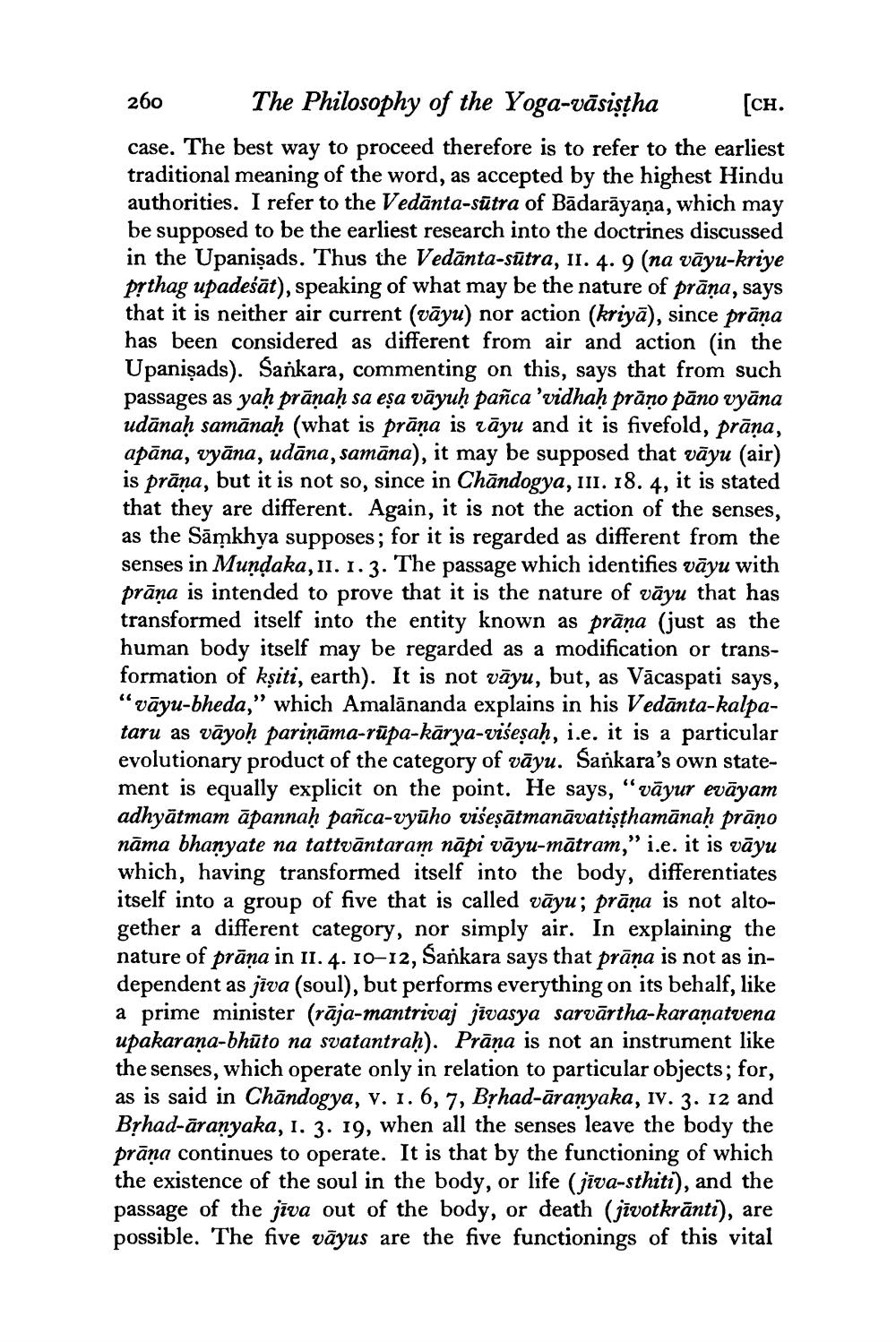________________
260 The Philosophy of the Yoga-vāsiştha [CH. case. The best way to proceed therefore is to refer to the earliest traditional meaning of the word, as accepted by the highest Hindu authorities. I refer to the Vedānta-sūtra of Bādarāyaṇa, which may be supposed to be the earliest research into the doctrines discussed in the Upanişads. Thus the Vedānta-sūtra, 11. 4. 9 (na vāyu-kriye pythag upadeśāt), speaking of what may be the nature of prāņa, says that it is neither air current (vāyu) nor action (kriyā), since prāņa has been considered as different from air and action in the Upanişads). Sankara, commenting on this, says that from such passages as yaḥ prāṇaḥ sa eșa vāyuḥ pañca 'vidhaḥ prāņo pāno vyāna udānaḥ samānaḥ (what is prāņa is rāyu and it is fivefold, prāņa, apāna, vyāna, udāna, samāna), it may be supposed that vāyu (air) is prāna, but it is not so, since in Chāndogya, 111. 18. 4, it is stated that they are different. Again, it is not the action of the senses, as the Sāmkhya supposes; for it is regarded as different from the senses in Mundaka, 11. 1. 3. The passage which identifies vāyu with prāna is intended to prove that it is the nature of vāyu that has transformed itself into the entity known as prāņa (just as the human body itself may be regarded as a modification or transformation of kșiti, earth). It is not vāyu, but, as Vācaspati says, "vāyu-bheda," which Amalānanda explains in his Vedānta-kalpataru as vāyoḥ pariņāma-rūpa-kārya-višeșah, i.e. it is a particular evolutionary product of the category of vāyu. Sankara's own statement is equally explicit on the point. He says, "vāyur evāyam adhyātmam āpannaḥ pañca-vyūho višeşātmanāvatişthamānaḥ prāņo nāma bhanyate na tattvāntaram nāpi vāyu-mātram," i.e. it is vāyu which, having transformed itself into the body, differentiates itself into a group of five that is called vāyu; prāņa is not altogether a different category, nor simply air. In explaining the nature of prāna in 11. 4. 10-12, Sankara says that prāna is not as independent as jīva (soul), but performs everything on its behalf, like a prime minister (rāja-mantrivaj jīvasya sarvārtha-karanatvena upakarana-bhūto na svatantraḥ). Prāņa is not an instrument like the senses, which operate only in relation to particular objects; for, as is said in Chāndogya, v. 1. 6, 7, Byhad-āranyaka, iv. 3. 12 and Brhad-āranyaka, 1. 3. 19, when all the senses leave the body the prāņa continues to operate. It is that by the functioning of which the existence of the soul in the body, or life (jīva-sthiti), and the passage of the jīva out of the body, or death (jīvotkrānti), are possible. The five vāyus are the five functionings of this vital




